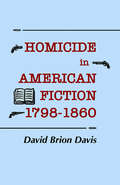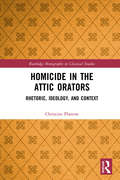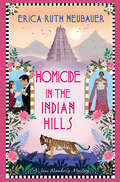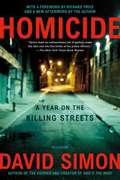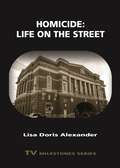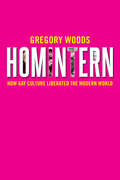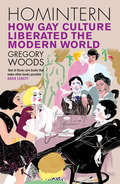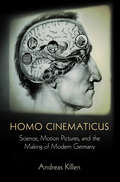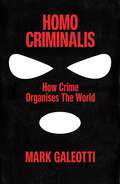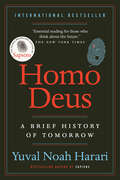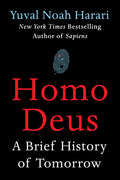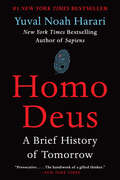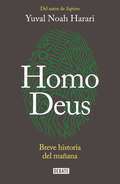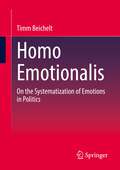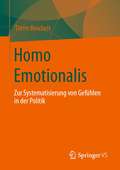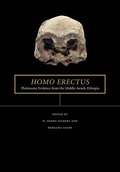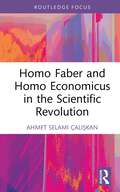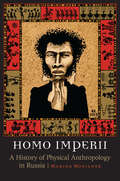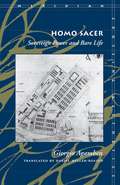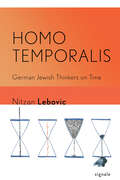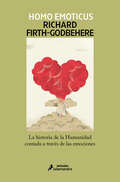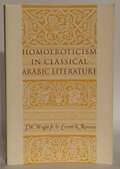- Table View
- List View
Homicide in American Fiction, 1798–1860: A Study in Social Values
by David Brion DavisHomicide has many social and psychological implications that vary from culture to culture and which change as people accept new ideas concerning guilt, responsibility, and the causes of crime. A study of attitudes toward homicide is therefore a method of examining social values in a specific setting. Homicide in American Fiction, 1798–1860 is the first book to contrast psychological assumptions of imaginative writers with certain social and intellectual currents in an attempt to integrate social attitudes toward such diverse subjects as human evil, moral responsibility, criminal insanity, social causes of crime, dueling, lynching, the "unwritten law" of a husband's revenge, and capital punishment. In addition to works of literary distinction by Cooper, Hawthorne, Irving, and Poe, among others, Davis considers a large body of cheap popular fiction generally ignored in previous studies of the literature of this period. This is an engrossing study of fiction as a reflection of and a commentary on social problems and as an influence shaping general beliefs and opinions.
Homicide in the Attic Orators: Rhetoric, Ideology, and Context (Routledge Monographs in Classical Studies)
by Christine PlastowThis study identifies specific features in the legal procedure and social perception of homicide in Athens in the time of the orators and examines how these features affected and were represented and utilised in forensic rhetoric. The socially transgressive nature of the crime in Athens resulted in homicide receiving a distinctive treatment in Athenian law, where it was ‘set apart’ from other crimes in a number of ways, including the courts in which it was tried, the procedures involved, and the fact that uniquely these laws were attributed to Drakon as mytho-historical lawgiver. Plastow explores how four distinctive features of homicide procedure and law at Athens played out in rhetoric: ideology, pollution, relevance, and the connected issues of motive and intent. Through exploration of these rhetorical themes, the volume also provides insight into the popular perceptions of homicide amongst the Athenians, since the orators’ speeches make extensive use of persuasive techniques that tap into the deeply held beliefs and ideologies of the jury members. A secondary aim is to explore the effects of the physical context of delivery on the rhetoric of homicide: the courtroom spaces themselves, whether homicide courts or popular courts, with the variable ideologies that their locations and physical attributes provoked, as well as the aspects of ritual that would have been performed physically during a homicide trial. Homicide in the Attic Orators offers insight into this complex subject, and is of interest to anyone with an interest in Athenian law, rhetoric, and society.
Homicide in the Indian Hills (A Jane Wunderly Mystery)
by Erica Ruth NeubauerIntrepid American newlywed Jane Wunderly learns that tigers aren&’t the only dangers lurking in 1920s India, when a murder in a popular resort town threatens to destabilize the local government and undermine the resistance movement for Indian self-rule . . .Ooty, 1927: Accompanying Mr. Redvers on an assignment to Ootacamund to quell revolutionary rumblings, Jane finds there&’s more than meets the eye to India&’s Queen of Hill Stations. Ooty&’s lush tea plantations and tranquil gardens barely conceal its secrets—scandalous affairs, political sabotage, and a mounting anti-colonial movement. Even Redvers intends to subvert his official mission in Ooty by arranging a series of clandestine meetings with local resistance leaders. But it&’s not until the shocking death of a British national that Jane and Redvers are truly drawn into Ooty&’s deepest shadows. Jane&’s suspicions that the death is more than a tragic accident are soon confirmed, but word of a murder could stoke Ooty&’s simmering tensions into a full boil. Navigating corrupt local officials, festering personal vendettas, and a complicated network of bureaucratic entanglements that lead to the top tiers of government, Jane and Redvers edge closer to the truth . . . and its deadly consequences. Someone is willing to spill blood to protect their interests: will Jane become just another of Ooty&’s darkest secrets?
Homicide: A Year On The Killing Streets
by David SimonThe scene is Baltimore. Twice every three days another citizen is shot, stabbed, or bludgeoned to death. At the center of this hurricane of crime is the city's homicide unit, a small brotherhood of hard men who fight for whatever justice is possible in a deadly world. David Simon was the first reporter ever to gain unlimited access to a homicide unit, and this electrifying book tells the true story of a year on the violent streets of an American city. The narrative follows Donald Worden, a veteran investigator; Harry Edgerton, a black detective in a mostly white unit; and Tom Pellegrini, an earnest rookie who takes on the year's most difficult case, the brutal rape and murder of an eleven-year-old girl. Originally published fifteen years ago, Homicide became the basis for the acclaimed television show of the same name. This new edition―which includes a new introduction, an afterword, and photographs―revives this classic, riveting tale about the men who work on the dark side of the American experience.
Homicide: Life on the Street (TV Milestones Series)
by Lisa Doris AlexanderRenowned for its unique visual style, Homicide: Life on the Street fundamentally changed the police procedural genre. The show broke records, featured memorable characters, and launched careers--most notably that of David Simon, whose own nonfiction book, Homicide: A Year on the Killing Streets, inspired the series, and who went on to create both The Wire and Treme. Homicide was an anomaly in the 1990s for its honest and open portrayals and discussions of race, and in this TV Milestone, Lisa Doris Alexander uses Critical Race Theory as a lens to highlight how the show illustrated the impacts that racial politics can have on policing. Homicide is one in a long line of police procedurals that date back to the early days of broadcast television, with series such as Dragnet (NBC 1951–59), Hawaii Five-O (CBS 1968–80), and Columbo (NBC 1971–78). But because Homicide takes place and was filmed in the majority-Black city of Baltimore, it makes sense that many of the main and supporting cast are Black. This differentiated it from the other shows of its genre and time. Chapter 1 discusses the Black-starring roles on Homicide in terms of being non-stereotypical and both written and performed as well-rounded, complex characters. Chapter 2 focuses on issues of race and racism and their impact on policing. Chapter 3 looks at other power dynamics, such as class, political clout, and social standing, and how those dynamics intersect with race and the criminal justice system’s perceived neutrality. In many regards, Homicide was ahead of its time. Alexander argues that Homicide reflects the politics of the Black Lives Matter movement, which in turn highlights the fact that the issues brought up by the movement are long-standing and that the series affirms the critiques BLM activists make about the criminal justice system. This book shows that the series’ oftentimes unflinching commentary on the systemic flaws within the criminal justice system not only feels more at home in today’s television and political landscape than it did in the 1990s but is just as relevant. Fans of the works of David Simon, as well as students and scholars of television studies and Critical Race Theory, will enjoy this enlightening book.
Homintern: How Gay Culture Liberated the Modern World
by Gregory WoodsIn a hugely ambitious study which crosses continents, languages, and almost a century, Gregory Woods identifies the ways in which homosexuality has helped shape Western culture. Extending from the trials of Oscar Wilde to the gay liberation era, this book examines a period in which increased visibility made acceptance of homosexuality one of the measures of modernity. Â Woods shines a revealing light on the diverse, informal networks of gay people in the arts and other creative fields. Uneasily called "the Homintern" (an echo of Lenin's "Comintern") by those suspicious of an international homosexual conspiracy, such networks connected gay writers, actors, artists, musicians, dancers, filmmakers, politicians, and spies. While providing some defense against dominant heterosexual exclusion, the grouping brought solidarity, celebrated talent, and, in doing so, invigorated the majority culture. Â Woods introduces an enormous cast of gifted and extraordinary characters, most of them operating with surprising openness; but also explores such issues as artistic influence, the coping strategies of minorities, the hypocrisies of conservatism, and the effects of positive and negative discrimination. Traveling from Harlem in the 1910s to 1920s Paris, 1930s Berlin, 1950s New York and beyond, this sharply observed, warm-spirited book presents a surpassing portrait of twentieth-century gay culture and the men and women who both redefined themselves and changed history.
Homintern: How Gay Culture Liberated the Modern World
by Gregory WoodsA landmark account of gay and lesbian creative networks and the seismic changes they brought to twentieth-century culture In a hugely ambitious study which crosses continents, languages, and almost a century, Gregory Woods identifies the ways in which homosexuality has helped shape Western culture. Extending from the trials of Oscar Wilde to the gay liberation era, this book examines a period in which increased visibility made acceptance of homosexuality one of the measures of modernity. Woods shines a revealing light on the diverse, informal networks of gay people in the arts and other creative fields. Uneasily called “the Homintern” (an echo of Lenin’s “Comintern”) by those suspicious of an international homosexual conspiracy, such networks connected gay writers, actors, artists, musicians, dancers, filmmakers, politicians, and spies. While providing some defense against dominant heterosexual exclusion, the grouping brought solidarity, celebrated talent, and, in doing so, invigorated the majority culture. Woods introduces an enormous cast of gifted and extraordinary characters, most of them operating with surprising openness; but also explores such issues as artistic influence, the coping strategies of minorities, the hypocrisies of conservatism, and the effects of positive and negative discrimination. Traveling from Harlem in the 1910s to 1920s Paris, 1930s Berlin, 1950s New York and beyond, this sharply observed, warm-spirited book presents a surpassing portrait of twentieth-century gay culture and the men and women who both redefined themselves and changed history.
Homo Cinematicus: Science, Motion Pictures, and the Making of Modern Germany
by Andreas KillenIn the early decades of the twentieth century, two intertwined changes began to shape the direction of German society. The baptism of the German film industry took place amid post-World War I conditions of political and social breakdown, and the cultural vacuum left by collapsing institutions was partially filled by moving images. At the same time, the emerging human sciences—psychiatry, neurology, sexology, eugenics, industrial psychology, and psychoanalysis—began to play an increasingly significant role in setting the terms for the way Germany analyzed itself and the problems it had inherited from its authoritarian past, the modernizing process, and war. Moreover, in advancing their professional and social goals, these sciences became heavily reliant on motion pictures.Situated at the intersection of film studies, the history of science and medicine, and the history of modern Germany, Homo Cinematicus connects the rise of cinema as a social institution to an inquiry into the history of knowledge production in the human sciences. Taking its title from a term coined in 1919 by commentator Wilhelm Stapel to identify a new social type that had been created by the emergence of cinema, Killen's book explores how a new class of experts in these new disciplines converged on the figure of the "homo cinematicus" and made him central to many of that era's major narratives and social policy initiatives.Killen traces film's use by the human sciences as a tool for producing, communicating, and popularizing new kinds of knowledge, as well as the ways that this alliance was challenged by popular films that interrogated the truth claims of both modern science and scientific cinema. In doing so, Homo Cinematicus endeavors to move beyond the divide between scientific and popular film, examining their historical coexistence and coevolution.
Homo Criminalis: How crime organises the world
by Mark Galeotti'Glittering... the author’s obvious enthusiasm for the subject is matched by impressive erudition' The Spectator'The readable, scary, fun beach read of new crime literature' Financial TimesWhen does a bandit become a monarch? When does a gang become a government? And is organised crime at the heart of every modern state?On a thrilling whistle-stop tour of how the world's criminal underbelly has shaped state-making, capitalism, globalisation and all forms of so-called legitimate power, Homo Criminalis shows the emergence of modern society through the evolution of the underworld and its crimes. From Chinese banditry and eighteenth-century English tea smuggling to today's cocaine submarines and the high-tech crimes of tomorrow, this book shows us how the world's dark underbelly shapes us, no matter how we try to outpace it.Entertaining, engaging and packed full of fascinating stories, Homo Criminalis is a book for those who want to see our grand story of progress through the surprising and subversive new lens of organised crime.
Homo Deus: A Brief History of Tomorrow
by Yuval Noah HarariFrom the author of the international bestseller Sapiens: A Brief History of Humankind comes an extraordinary new book that explores the future of the human species. Yuval Noah Harari, author of the bestselling Sapiens: A Brief History of Humankind, envisions a not-too-distant world in which we face a new set of challenges. In Homo Deus, he examines our future with his trademark blend of science, history, philosophy and every discipline in between. Homo Deus explores the projects, dreams and nightmares that will shape the twenty-first century - from overcoming death to creating artificial life. It asks the fundamental questions: Where do we go from here? And how will we protect this fragile world from our own destructive powers? This is the next stage of evolution. This is Homo Deus. War is obsolete You are more likely to commit suicide than be killed in conflict Famine is disappearing You are at more risk of obesity than starvation Death is just a technical problem Equality is out - but immortality is in What does our future hold?From the Hardcover edition.
Homo Deus: A Brief History of Tomorrow
by Yuval Noah HarariInternational Bestseller From the author of the international bestseller Sapiens: A Brief History of Humankind comes an extraordinary new book that explores the future of the human species. Yuval Noah Harari, author of the bestselling Sapiens: A Brief History of Humankind, envisions a not-too-distant world in which we face a new set of challenges. In Homo Deus, he examines our future with his trademark blend of science, history, philosophy and every discipline in between. Homo Deus explores the projects, dreams and nightmares that will shape the twenty-first century – from overcoming death to creating artificial life. It asks the fundamental questions: Where do we go from here? And how will we protect this fragile world from our own destructive powers? This is the next stage of evolution. This is Homo Deus. War is obsolete You are more likely to commit suicide than be killed in conflict Famine is disappearing You are at more risk of obesity than starvation Death is just a technical problem Equality is out – but immortality is in What does our future hold?
Homo Deus: A Brief History of Tomorrow
by Yuval Noah HarariOfficial U.S. edition with full color illustrations throughout.NEW YORK TIMES BESTSELLER Yuval Noah Harari, author of the critically-acclaimed New York Times bestseller and international phenomenon Sapiens, returns with an equally original, compelling, and provocative book, turning his focus toward humanity’s future, and our quest to upgrade humans into gods.Over the past century humankind has managed to do the impossible and rein in famine, plague, and war. This may seem hard to accept, but, as Harari explains in his trademark style—thorough, yet riveting—famine, plague and war have been transformed from incomprehensible and uncontrollable forces of nature into manageable challenges. For the first time ever, more people die from eating too much than from eating too little; more people die from old age than from infectious diseases; and more people commit suicide than are killed by soldiers, terrorists and criminals put together. The average American is a thousand times more likely to die from binging at McDonalds than from being blown up by Al Qaeda.What then will replace famine, plague, and war at the top of the human agenda? As the self-made gods of planet earth, what destinies will we set ourselves, and which quests will we undertake? Homo Deus explores the projects, dreams and nightmares that will shape the twenty-first century—from overcoming death to creating artificial life. It asks the fundamental questions: Where do we go from here? And how will we protect this fragile world from our own destructive powers? This is the next stage of evolution. This is Homo Deus.With the same insight and clarity that made Sapiens an international hit and a New York Times bestseller, Harari maps out our future.
Homo Deus: A Brief History of Tomorrow
by Yuval Noah HarariYuval Noah Harari, author of the critically-acclaimed New York Times bestseller and international phenomenon Sapiens, returns with an equally original, compelling, and provocative book, turning his focus toward humanity’s future, and our quest to upgrade humans into gods.Over the past century humankind has managed to do the impossible and rein in famine, plague, and war. This may seem hard to accept, but, as Harari explains in his trademark style—thorough, yet riveting—famine, plague and war have been transformed from incomprehensible and uncontrollable forces of nature into manageable challenges. For the first time ever, more people die from eating too much than from eating too little; more people die from old age than from infectious diseases; and more people commit suicide than are killed by soldiers, terrorists and criminals put together. The average American is a thousand times more likely to die from binging at McDonalds than from being blown up by Al Qaeda.What then will replace famine, plague, and war at the top of the human agenda? As the self-made gods of planet earth, what destinies will we set ourselves, and which quests will we undertake? Homo Deus explores the projects, dreams and nightmares that will shape the twenty-first century—from overcoming death to creating artificial life. It asks the fundamental questions: Where do we go from here? And how will we protect this fragile world from our own destructive powers? This is the next stage of evolution. This is Homo Deus.With the same insight and clarity that made Sapiens an international hit and a New York Times bestseller, Harari maps out our future.
Homo Deus: Breve historia del mañana
by Yuval Noah HarariTras el éxito de Sapiens. De animales a dioses, Yuval Noah Harari vuelve su mirada al futuro para ver hacia dónde nos dirigimos. La guerra es algo obsoleto. Es más probable quitarse la vida que morir en un conflicto bélico. La hambruna está desapareciendo. Es más habitual sufrir obesidad que pasar hambre. La muerte es solo un problema técnico. Adiós igualdad. Hola inmortalidad. ¿Qué nos depara el futuro? Yuval Noah Harari, autor bestseller de Sapiens. De animales a dioses, augura un mundo no tan lejano en el cual nos veremos enfrentados a una nueva serie de retos. Homo Deus explora los proyectos, los sueños y las pesadillas que irán moldeando el siglo XXI -desde superar la muerte hasta la creación de la inteligencia artificial. - Cuando tu Smartphone te conozca mejor de lo que te conoces a ti mismo, ¿seguirás escogiendo tu trabajo, a tu pareja y a tu presidente? - Cuando la inteligencia artificial nos desmarque del mercado laboral, ¿encontrarán los millones de desempleados algún tipo de significado en las drogas o los juegos virtuales? - Cuando los cuerpos y cerebros sean productos de diseño, ¿cederá la selección natural el paso al diseño inteligente? Esto es el futuro de la evolución. Esto es Homo Deus.
Homo Deus: Breve historia del mañana
by Yuval Noah HarariTras el éxito de Sapiens, Yuval Noah Harari vuelve su mirada al futuro para ver hacia dónde nos dirigimos. Bestseller del New York Times con 1 millón de ejemplares vendidos Yuval Noah Harari, autor de Sapiens, un fenómeno internacional unánimemente aclamado por la crítica, regresa con una secuela igualmente original, convincente y provocadora, centrando su atención en el futuro de la humanidad y en nuestra obsesión por convertirnos en dioses. A lo largo del último siglo, la humanidad ha logrado lo imposible frenando la hambruna, la peste y la guerra. Por primera vez en la historia, más personas mueren por obesidad que por pasar hambre y hay más probabilidades de quitarse la vida que de morir en un conflicto bélico o un atentado terrorista. ¿Qué pasará con la democracia cuando Google y Facebook lleguen a conocer nuestros gustos y preferencias políticas mejor que nos conocemos a nosotros mismos? ¿Qué pasará con el estado de bienestar cuando la inteligencia artificial expulse a los individuos del mercado laboral, creando una «clase innecesaria» de humanos? ¿Cómo podremos lidiar con los avances en ingeniería genética? ¿Terminará Silicon Valley por establecer nuevas religiones en lugar de enfocarse a producir únicamente dispositivos inteligentes? Homo Deus explora los proyectos, los sueños y las pesadillas que configurarán el siglo XXI: desde superar la muerte hasta la creación de la inteligencia y la vida artificial. ¿Hacia dónde nos dirigimos? ¿Cómo protegeremos al mundo de nuestros propios poderes destructivos? He aquí una mirada hacia el futuro de la evolución. He aquí Homo Deus. Reseñas:«Yuval Noah Harari, autor del fenómeno Sapiens, reflexiona sobre el futuro de la humanidad en Homo Deus, un libro de prosa inteligente, fresca y libre de prejuicios.»Jorge Wagensberg, Babelia «Aún más legible, incluso más importante que su excelente Sapiens.»Kazuo Ishiguro, Premio Nobel de Literatura «Homo Deus te impactará y te cautivará, pero sobre todo te hará pensar como nunca antes.»Daniel Kahneman, Premio Nobel de Economía «Harari se convierte en una especie de filósofo del futuro que desarrolla las intuiciones de su primera obra [...] un ritmo y una energía que convierten Homo Deus en un libro francamente ameno.»El Cultural «El épico y mundialmente celebrado Sapiens recibe la secuela que necesitaba: una intensa y compulsiva investigación sobre el apocalipsis de la humanidad en un futuro impulsado por la tecnología.»The Guardian «Un libro implacable y fascinante que seguramente se convertirá, y merece ser un éxito de ventas.»Kirkus Review «Un estimulante libro que lleva al lector a profundizar sobre cuestiones de identidad, conciencia e inteligencia.»The Observer «Un brebaje embriagador de ciencia, filosofía y futurismo.»Mail on Sunday «Un estudio brillante, original, estimulante e importante sobre hacia dónde se dirige la humanidad.»Evening Standard
Homo Emotionalis: On the Systematization of Emotions in Politics
by Timm BeicheltIn this book, important works and approaches of policy-oriented emotion research are brought into a systematic context. For this purpose, three different types of emotions are elaborated, which in their totality constitute Homo Emotionalis: binary emotions, basic emotions, reflexive emotions. They correspond to individual-psychological stages of development, but are also relevant in the social and political handling of emotions. The interplay of emotion types and social constellations leads to different modes of political action, which shape different forms of emotional politics. In each case, individual logics emerge along which emotional politics is pursued. With its interdisciplinary focus, this volume is aimed at political scientists, anthropologists, sociologists and social psychologists.
Homo Emotionalis: Zur Systematisierung von Gefühlen in der Politik
by Timm BeicheltIn diesem Buch werden wichtige Werke und Ansätze der politikorientierten Emotionenforschung in einen systematischen Zusammenhang gebracht. Dafür werden drei unterschiedliche Typen von Emotionen herausgearbeitet, die in ihrer Gesamtheit den Homo Emotionalis ausmachen: binäre Emotionen, Basisemotionen, reflexive Emotionen. Sie entsprechen individualpsychologischen Entwicklungsstufen, sind aber auch im sozialen und politischen Umgang mit Emotionen relevant. Das Zusammenspiel von Emotionentypen und gesellschaftlichen Konstellationen führt zu verschiedenen Modi politischen Handelns, die unterschiedliche Formen von emotionaler Politik prägen. Es entstehen jeweils eigene Logiken, entlang derer Emotionenpolitik betrieben wird. Der Band richtet sich mit seinem interdisziplinären Fokus an Politikwissenschaft*innen, Anthropolog*innen, Soziolog*innen und Sozialpsycholog*innen.
Homo Erectus: Pleistocene Evidence from the Middle Awash, Ethiopia
by W. Henry Gilbert Berhane AsfawThis book provides the first detailed descriptions, photographs, and analysis of the fossil vertebrates--from elephants and hyenas to humans--from the Daka Member of the Bouri Formation of the Afar, a place renowned for an abundant and lengthy record of human ancestors.
Homo Faber and Homo Economicus in the Scientific Revolution
by Ahmet Selami ÇalışkanThis book tells the story of how the "servile arts" turned into the "mechanical arts," which in turn developed into a kind of philosophical apparatus that made modern science possible. Why did the scientific revolution take place in the West and not in China or the Islamic world? How did humanity’s progress in science and technology, which had been moving along at a relatively steady pace for tens of thousands of years, end up taking such an unprecedented leap? Subjecting the history of thought and technology to a novel interpretation based on the relationship between theory and practice, Ahmet Selami Çalışkan argues that the industrial revolution and modern science—and the scientific revolution that preceded both—did not alone suffice to sort out the philosophical problems of their day or to produce the institutions of the modern age. Both required a new sort of human: Homo economicus faber. Tracing the historical emergence of this figure and its persistence in our own age, this book offers an innovative and holistic assessment of the economic, cultural and political effects of centuries of interaction between East and West and their repercussions in our world today.
Homo Imperii: A History of Physical Anthropology in Russia (Critical Studies in the History of Anthropology)
by Marina MogilnerIt is widely assumed that the &“nonclassical&” nature of the Russian empire and its equally &“nonclassical&” modernity made Russian intellectuals immune to the racial obsessions of Western Europe and the United States. Homo Imperii corrects this perception by offering the first scholarly history of racial science in prerevolutionary Russia and the early Soviet Union. Marina Mogilner places this story in the context of imperial self-modernization, political and cultural debates of the epoch, different reformist and revolutionary trends, and the growing challenge of modern nationalism. By focusing on the competing centers of race science in different cities and regions of the empire, Homo Imperii introduces to English-language scholars the institutional nexus of racial science in Russia that exhibits the influence of imperial strategic relativism.Reminiscent of the work of anthropologists of empire such as Ann Stoler and Benedict Anderson, Homo Imperii reveals the complex imperial dynamics of Russian physical anthropology and contributes an important comparative perspective from which to understand the emergence of racial science in nineteenth- and twentieth-century Europe and America.
Homo Ludens: A Study of the Play Element in Culture
by Johan Huizingasociology book on the role of playing in historical cultures.
Homo Sacer: Sovereign Power and Bare Life
by Giorgio AgambenThe author in this book aims to connect the problem of pure possibility, potentiality, and power with the problem of political and social ethics in a context where the latter has lost its previous religious, metaphysical, and cultural grounding.
Homo Temporalis: German Jewish Thinkers on Time (Signale: Modern German Letters, Cultures, and Thought)
by Nitzan Itzhak LebovicHomo Temporalis focuses on the importance of temporal concepts for four German Jewish thinkers who profoundly shaped twentieth-century intellectual history: Martin Buber, Walter Benjamin, Hannah Arendt, and Paul Celan. By analyzing the concept of time, Nitzan Lebovic explores Buber's stress on the temporality of the dialogue between I and Thou; Benjamin's now-time and "dialectics in standstill"; Arendt's understanding of democracy as "natality" or a "permanent revolution"; and the "breathturn" that informs Celan's poetry. Framing the reception of German Jewish thinking in the second half of the twentieth century as a parallel story to the rise of the modern humanities, Homo Temporalis also highlights how these foundational temporal concepts illuminate the causes of the present crisis in the humanities and its disciplinary limitations in the age of biopolitics and the Anthropocene.
Homo emoticus: La historia de la Humanidad contada a través de las emociones
by Richard Firth-GodbehereLa historia humana contada desde las emociones. A los humanos nos gusta pensar en nosotros mismos como criaturas racionales. Sin embargo, algunos de los momentos más excepcionales de la historia no tratan de acontecimientos sino de sentimientos: los orígenes de la filosofía, el nacimiento del cristianismo, la caída de Roma, la Revolución científica o los grandes conflictos bélicos del siglo XX no pueden entenderse sin las emociones. Gracias a sus sólidos conocimientos en psicología, neurociencia, arte, filosofía y religión, Richard Firth-Godbehere hilvana un fascinante recorrido por la historia de la humanidad desde una perspectiva absolutamente original, un relato que explica cómo las emociones han modelado el mundo en el que vivimos con toda su complejidad, maravilla y diversidad. La crítica ha dicho...«Una mirada fascinante al papel de las emociones humanas en la forja de la historia y la cultura universales.»Gina Rippon, autora de El género y nuestros cerebros «Las emociones son una parte mucho más importante de la experiencia del ser humano de lo que la mayoría de la gente cree. Si quieres saber más sobre las emociones y cómo hemos llegado a entenderlas, este libro es exactamente lo que necesitas.»Dean Burnett, autor de El cerebro feliz «Tanto si buscas nuevas ideas, como historia narrativa, teoría psicológica o antropología cultural, este libro te enseñará algo nuevo sobre cómo la gente ha sentido a través de los tiempos. Un libro como ningún otro.»Thomas Dixon, autor de Weeping Britannia: Portrait of a Nation in Tears
Homoeroticism in Classical Arabic Literature
by J. W. Wright Everett K. RowsonThere is a wealth of homoerotic allusion found in classical Arabic literature from pre-Islamic poems to the Thousand and One Nights. Images and narratives often glorify the male body as beautiful, youthful, or erotic. While such masculine allusion and homoerotic imagery have been recognized as significant elements of classical Arabic literature, they have either been misunderstood or lacked sustained analysis. Exploring the underlying meanings of these motifs, Homoeroticism in Classical Arabic Literature does not so much delineate or identify homosexuality in Arabic literature as offer new, cogent readings of how homoeroticism can be identified by viewing classic Arabic literature through various analytical lenses. A collection of essays by the most influential scholars in the field, this book brings to bear a variety of critical perspectives, ranging from traditional philology to Lacanian analysis, on a literary corpus that includes classical lyric poetry, anecdotal collections, mystical narratives, manuals for dream interpretation, vernacular songs, and shadow plays. These studies investigate both the complexity of attitudes underlying homoerotic allusion and the surprisingly variegated and subtle meanings it can convey.
